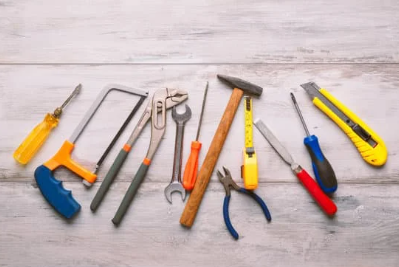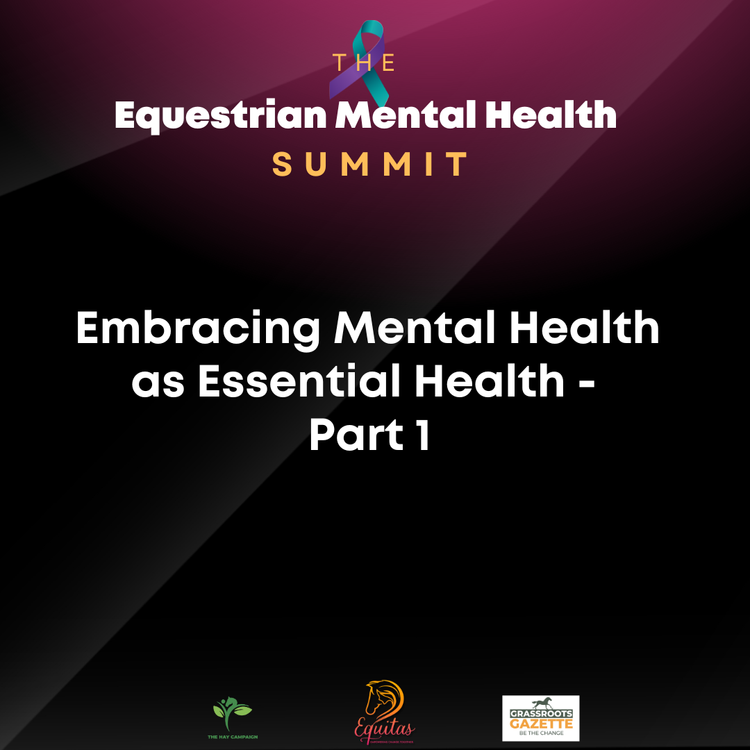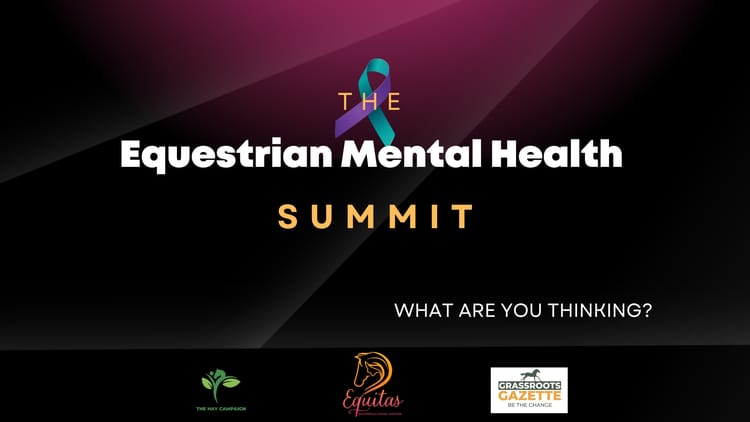My Mental Health Toolkit

I bloody love Equestrian Mental Health Week. Letting equestrians talk openly about their mental health with no judgement, and also beginning to look out for each other is a massive step forward for us all. No bad thing can come from our community standing together to support each other.
I believe that everyone’s mental health journey is unique. Our triggers, experiences and solutions are all completely different. If you feel as though you struggle with your mental health, even just occasionally, it is a good idea to have a back-up plan to help you get back on track asap. I wanted to share what I keep in my “mental health toolkit” to help me when things get tough and the steps I take to stop a “bad day” in its tracks. These tips may or may not work for you, however if even one of these can inspire you to create your own toolkit then I have done my job.
Recognising the signs
I have spent a long (very long) time getting to really know myself. I am grateful that I have been able to work out my core values and therefore which decisions align with these, and which do not. It has allowed me to carefully exit situations in my life which were having a toxic affect and create strong relationships with those who share my values.
Along with this, I am able to recognise when a potentially less favourable mood is on its way. I check in with myself regularly by asking myself “why did I react like that?” or “why am I feeling this way?”, and by doing this, I can recognise if something isn’t quite right within myself. Further to this, I can start to work out what the trigger was, and look to rectify that situation.
A “Good Day checklist”
There are certain things that I need to do every day in order to have a good day. These are different for everyone but having a physical list of things that you can tick off is a great tool to help you mental health. I don’t use my list every day, but if I’m going through a rough patch or feeling low, I make sure I go through my list in order to pick my mood up as much as I can.
Here is an example of the list I use. It sits in the notes section of my phone and I can pull it up whenever I need to:

Beating Procrastination
My name is Aaron Cork, and I’m a Procrastinator.
Due to the nature of my anxiety, I can really struggle with big tasks ahead. I also, weirdly, tend to work better under pressure but that means I generally leave things until the very last minute. However, the feeling of procrastination is awful. That “I should have been doing that” feeling can really make you feel like a useless human being sometimes. The trick I have is that anytime I really can’t face up to doing a task that I really know I should be doing, I just do ANYTHING else useful. Even if it’s putting a load of washing on, or cleaning my tack etc. It means that the time I should have been using for the Big Task hasn’t been fully wasted so I don’t feel so bad about it afterwards. Obviously, the time would have been spent doing whatever I should have been doing, but this trick is about making myself feel better about my anxiety, and not forcing myself to do something when I’m not in the right frame of mind.
Having a support network
I could bang on about this all day every day, but having people around you who are aware of your struggles and will support you, is priceless. I have certain friends that I know I can contact at any point when I’m starting to feel low. I have one friend who I know will distract me if I need it, another who will just listen to me rant about whatever I want, and others who will just talk things through with me and help me work out my thought processes. My boyfriend is also extremely understanding of mental health struggles, so he is a great sounding board for my over thinking! However, even if your partner, or family, just don’t “get” mental health issues (some people really don’t, and there’s no problem with that), you will be able to find someone in your network who will. Just remember that those who do not understand your struggles are not bad people, they have possibly just never experienced what you’re going through so therefore don’t know how to handle it. Some people find the pressure of being a mental health support too much, and that’s ok too. Finding the people who you CAN speak to and who do understand is a very important step.
Taking medication
I am not ashamed of the fact that I am on medication for my mental health. I started taking it about 18 months ago when I was going through a really rough time, and have been on it ever since. I started on 20mg per day, and I am now on 10mg every other day. I have tried to stop taking it several times in the last few months, however I have found I really need the small dose in order to keep my head level. It helps me deal with unexpected situations which crop up, and allows me to think more clearly.

Everyone’s experience of mental health medication is different. There are so many different types out there and all have different effects. I am lucky that this one works perfectly for me, and I have no side affects (that I am aware of). Again, people’s opinions of medication is different. Some people are really against it, and others are all for it. I am firmly in the latter camp as it has done wonders for me.
If you find yourself in a mental health spiral, and are struggling to get yourself out, there is no shame in speaking to a doctor about potential medication. Some only need it for a short time, to help them out of a hole, while others (like me) need a more constant chemical support.
Hydration
I’m fairly ashamed to say that I have only recently realised that my hydration levels have a direct impact on my mood. The first thing I do when I’m feeling those anxious thoughts creeping in, is drink a pint of water.
I did some research recently and it turns out that when you’re dehydrated, your body is unable to create serotonin (your happy hormone) in your brain. If, like me, you are already predisposed to a lack of serotonin then this is obviously a bit of a disaster. Dehydration, along with affecting most things in your body, also depletes other amino acids in your brain, leading to feelings of anxiety, dejection and irritability. This also explains why you get that feeling of “hangxiety” when you’ve been drinking. I personally tend to avoid alcohol when I’m feeling low for this very reason.
I hope you have found this glimpse into my Mental Health Toolkit helpful, and I really hope you take the time to create your own to give you the tools you need to lead a happier and more stress free life.
Aaron Cork.





